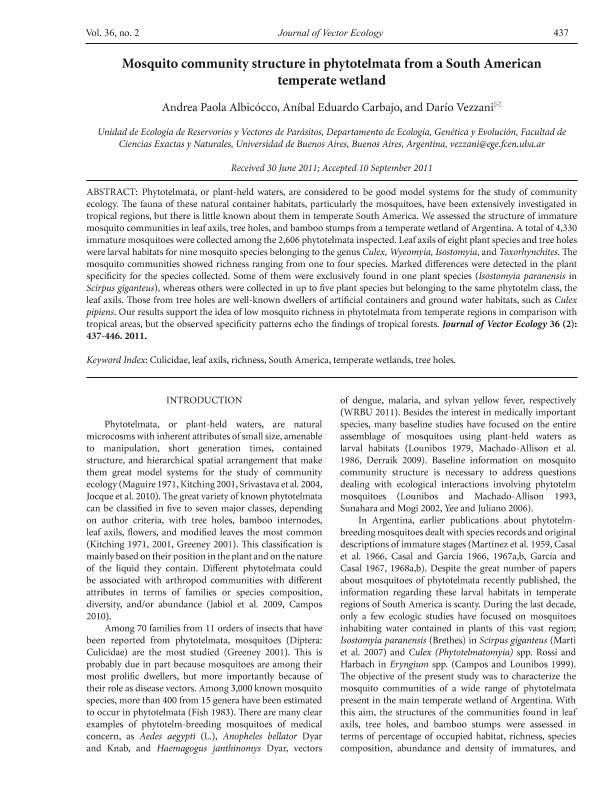Mostrar el registro sencillo del ítem
dc.contributor.author
Albicócco, Andrea Paola

dc.contributor.author
Carbajo, Anibal Eduardo

dc.contributor.author
Vezzani, Dario

dc.date.available
2019-01-29T17:57:55Z
dc.date.issued
2011-12
dc.identifier.citation
Albicócco, Andrea Paola; Carbajo, Anibal Eduardo; Vezzani, Dario; Mosquito community structure in phytotelmata from a South American temperate wetland; Society for Vector Ecology; Journal of Vector Ecology; 36; 2; 12-2011; 437-446
dc.identifier.issn
1081-1710
dc.identifier.uri
http://hdl.handle.net/11336/68868
dc.description.abstract
Phytotelmata, or plant-held waters, are considered to be good model systems for the study of community ecology. The fauna of these natural container habitats, particularly the mosquitoes, have been extensively investigated in tropical regions, but there is little known about them in temperate South America. We assessed the structure of immature mosquito communities in leaf axils, tree holes, and bamboo stumps from a temperate wetland of Argentina. A total of 4,330 immature mosquitoes were collected among the 2,606 phytotelmata inspected. Leaf axils of eight plant species and tree holes were larval habitats for nine mosquito species belonging to the genus Culex, Wyeomyia, Isostomyia, and Toxorhynchites. The mosquito communities showed richness ranging from one to four species. Marked differences were detected in the plant specificity for the species collected. Some of them were exclusively found in one plant species (Isostomyia paranensis in Scirpus giganteus), whereas others were collected in up to five plant species but belonging to the same phytotelm class, the leaf axils. Those from tree holes are well-known dwellers of artificial containers and ground water habitats, such as Culex pipiens. Our results support the idea of low mosquito richness in phytotelmata from temperate regions in comparison with tropical areas, but the observed specificity patterns echo the findings of tropical forests.
dc.format
application/pdf
dc.language.iso
eng
dc.publisher
Society for Vector Ecology

dc.rights
info:eu-repo/semantics/openAccess
dc.rights.uri
https://creativecommons.org/licenses/by-nc-sa/2.5/ar/
dc.subject
Culicidae
dc.subject
Leaf Axils
dc.subject
Richness
dc.subject
South America
dc.subject
Temperate Wetlands
dc.subject
Tree Holes
dc.subject.classification
Otras Ciencias Biológicas

dc.subject.classification
Ciencias Biológicas

dc.subject.classification
CIENCIAS NATURALES Y EXACTAS

dc.title
Mosquito community structure in phytotelmata from a South American temperate wetland
dc.type
info:eu-repo/semantics/article
dc.type
info:ar-repo/semantics/artículo
dc.type
info:eu-repo/semantics/publishedVersion
dc.date.updated
2019-01-28T14:13:06Z
dc.journal.volume
36
dc.journal.number
2
dc.journal.pagination
437-446
dc.journal.pais
Estados Unidos

dc.description.fil
Fil: Albicócco, Andrea Paola. Universidad de Buenos Aires. Facultad de Ciencias Exactas y Naturales. Departamento de Ecología, Genética y Evolución; Argentina. Consejo Nacional de Investigaciones Científicas y Técnicas; Argentina
dc.description.fil
Fil: Carbajo, Anibal Eduardo. Universidad de Buenos Aires. Facultad de Ciencias Exactas y Naturales. Departamento de Ecología, Genética y Evolución; Argentina. Consejo Nacional de Investigaciones Científicas y Técnicas; Argentina
dc.description.fil
Fil: Vezzani, Dario. Universidad de Buenos Aires. Facultad de Ciencias Exactas y Naturales. Departamento de Ecología, Genética y Evolución; Argentina. Consejo Nacional de Investigaciones Científicas y Técnicas; Argentina
dc.journal.title
Journal of Vector Ecology

dc.relation.alternativeid
info:eu-repo/semantics/altIdentifier/doi/http://dx.doi.org/10.1111/j.1948-7134.2011.00185.x
dc.relation.alternativeid
info:eu-repo/semantics/altIdentifier/url/https://onlinelibrary.wiley.com/doi/full/10.1111/j.1948-7134.2011.00185.x
Archivos asociados
